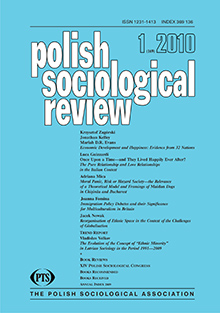Economic Development and Happiness: Evidence from 32 Nations
Economic Development and Happiness: Evidence from 32 Nations
Author(s): Mariah Evans, Krzysztof Zagórski, Jonathan KelleySubject(s): Social Sciences
Published by: Polskie Towarzystwo Socjologiczne
Keywords: happiness; life satisfaction; income; education; economic development; international comparisons
Summary/Abstract: Drawing on reference group, relative deprivation, conspicuous consumption and hierarchy of needs theories, this paper tests the hypothesis that goods (material and other) bring more satisfaction if few other people have them. We test this hypothesis by estimating the effect of education and income on happiness in large representative national samples from 32 nations at various levels of economic development. The results indicate that, net of individuals' socio-demographic characteristics and country's level of development, the higher the average education in a given society, the smaller the gain from advanced education on individuals' happiness. Similarly, the richer the society, the less do gains in family income confer gains in individuals' happiness. Thus, the more that goods such as education and income diffuse through a society, the less they enhance people's subjective well-being. However, the nation's level of economic development has a strong, independent positive effect on well-being. Taken together, the quantitative implication of these patterns is that economic growth enhances well-being, especially for poor people, and more so in poor nations than in rich nations.
Journal: Polish Sociological Review
- Issue Year: 169/2010
- Issue No: 1
- Page Range: 3-19
- Page Count: 16
- Language: English

